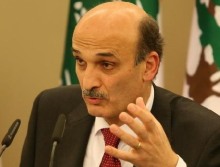
According to a statement issued by the Lebanese Forces’ media office, LF leader Samir Geagea proposed during Thursday’s national dialogue session reinforcing the Lebanese Armed Forces’ (LAF) deployment in the South by placing Hezbollah units under the command of the Lebanese army ,
The LAF should construct a system of fortifications to defend against Israeli attacks in the South, and LAF special forces should be deployed “within the cities, towns and villages of the South wearing civilian clothing” so that they could “fight as small units in a decentralized fashion” if necessary, Geagea added.
According to Geagea, the LAF demonstrated during the August 3 Adaisseh border skirmish with the Israeli army that it can confront the Jewish State with the support of the Lebanese people, state, and Arab allies.
“The essential condition for the success of this plan is that the operational command for the defense of Lebanon be completely in the hand of the Lebanese army, with Hezbollah being asked to put its units and weapons under the Lebanese army’s command,” Geagea said.
He added that “this is a transitional plan giving Lebanon the best possible opportunity to defend its borders at the present time”
The national dialogue should continue to seek a “final solution to Hezbollah’s weapons,” he added
After the session, Hezbollah MP Mohammad Raad described Geagea’s proposal as “not positive and not encouraging”.
“The aim of Geagea’s proposal is not to defend Lebanon, but rather to get rid of Hezbollah and its arms,” added Raad.
“If you are thinking of raising the weapons issue, this thinking has become outdated. Sometimes you describe us as partners in this country and other times you describe us as Iranians,” Raad told Geagea.
At this point, MPs Talal Arslan and Suleiman Franjieh intervened to back Raad’s point of view.
“Haven’t we learned from the past: we have to preserve the strength of our Resistance,” said Franjieh.
Speaker Nabih Berri stressed that he was “pleased” with Geagea’s proposal “because for the first time he has acknowledged the ‘army-people-resistance’ formula and the rest is small details.”
“The Resistance needs us all to embrace it,” added Berri.
Geagea responded by saying: “We’d protect the Resistance with our eyelashes provided that it becomes our collective resistance and in the form we see fit for all of us. Let’s imagine (PM Saad) Hariri, ( former PM Fouad) Siniora, (MP Jean) Oghassabian and (MP Michel) Pharaon deciding to establish a resistance movement, would we back their step?”
The LF leader went on with clarifying his stance to Berri. “I don’t believe in the ‘army-people-resistance’ formula, but rather in the theory of the people and the State, with all its institutions, including the army. But given the current circumstances, and because we haven’t yet found a solution to the arms dilemma, I’ve submitted this paper in order to benefit from these arms at their place of deployment, under the stipulations of this paper.”
Geagea’s proposal was supported by MPs Pharaon, Oghassabian and Deputy Speaker Farid Makari who described the paper as balanced, calling for integrating it within the national defense strategy.
Former PM Fouad Siniora warned against “repeating what happened in the summer of 2006,” stressing “the need that war and peace decisions be in the State’s hand.”
Arslan responded to Siniora by saying: “Does anyone have doubts about Israel’s hostile intentions? It wants to destroy Lebanon with or without an alibi.”
PM Hariri intervened by saying “everyone is entitled to his opinion and we must respect each other ‘s opinions.” He called for “stopping the approach of treason accusations and charges.”
Before the end of the session, Geagea snapped back at Arslan’s remarks saying: “If Hezbollah didn’t abduct the two Israeli soldiers, the war wouldn’t have happened, and (Hezbollah chief) Sayyed Nasrallah himself said ‘if I only knew.’”
“After the 2006 war, the Israeli government formed the Winograd Commission to assess accountability regarding that war. What have we done in Lebanon? Have we formed a commission to distinguish the costs and the gains of the war?” Geagea added.
Right after the session, Berri described the dialogue as “70 percent calm.”

Leave a Reply
You must be logged in to post a comment.